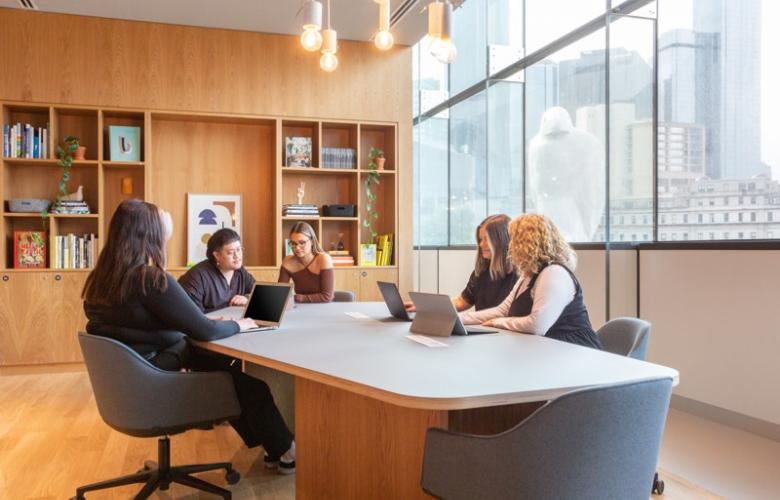Why Commute for more than 15 minutes? How Landlords and Franchisees can help workers commute less & enjoy more
Contact
Why Commute for more than 15 minutes? How Landlords and Franchisees can help workers commute less & enjoy more
According to Fatima Koning, Group Chief Commercial Officer for IWG, the rise in hybrid working shows companies are listening to their employees’ needs and taking a people-centric approach to their workspace strategies. We look at what this means for commercial landlords and franchise operators.
Speaking on a panel at the recent Economist Innovation@Work US Summit, Fatima Koning, Group Chief Commercial Officer for IWG, said companies are taking a people-centric approach as they transition to hybrid working. “The employee’s voice has become prominent in defining what the office should be in the future – what the purpose of the office is, what facilities it should and shouldn’t have, and its location,” she said.
Expanding upon this, Koning described the shift in attitudes towards the daily commute. The concept of commuting an hour each way to the same place five days a week is no longer viable for much of the global workforce, and recent research from IWG – the world’s leading flexible office space provider – found that 77% of workers would like to work in a space closer to where they actually live.
If you are a commercial landlord, franchise operator or anyone else with a vested interest in commercial property, Koning’s address has some interesting implications for how you can better serve the needs of your clients by helping them better cater to the needs of their teams.
‘Why should we be commuting for longer than 15 minutes every single day of the week?’
For generations, we have accepted lengthy commutes as part and parcel of doing business. But Fatima Koning has identified a clear desire among the workforce for high-quality business facilities outside of the glass spires of our urban centres.
“Some of us are asking: ‘Why should we be commuting for longer than 15 minutes every single day of the week?’” she said. “‘It should be possible for us to access high-quality workspace within a 15-minute drive, or a short walk or bike ride.’”
Research from IWG revealed half of workers would quit their jobs if asked to return to the office full-time, having fully realised how working in the hybrid model benefits their wellbeing and productivity. The global digital workforce has transitioned to a new way of working that requires employees to revise their workplace strategies. As employers seriously revise their operational models to recruit and retain top-tier talent, this creates intriguing opportunities for landlords and franchise operators.
“I think those companies who weren’t working flexibly before 2020 have now overcome a lot of limiting beliefs,” said Koning. “For example, that people cannot be productive working from home. Or, that spending considerable time outside of the HQ is bad for productivity. In fact, with the hybrid model, you can get the best of all worlds, with a better work-life balance and improved productivity.”
Hybrid enables businesses to have their proverbial cake and eat it, significantly reducing their real estate spending, while also boosting employee morale and productivity. By tailoring their offerings to this newfound enthusiasm for hybrid, investors can help their clients to identify a better way of working.
The hybrid revolution, and what it means for you
A hybrid workspace strategy allows employees to divide their working hours between their home, their company’s headquarters and a local flexible office space, depending on where they will be at their most productive on any given day.
Companies setting their hybrid work policies are revising their real estate portfolio to include flexible office and coworking spaces outside of city centres, closer to where their employees actually live. It’s about providing an alternative to working from home for those who need it – whether they want to escape domestic distractions, or to have access to high-quality office facilities. “There are people for whom a home office is a luxury they cannot afford to have,” she said. “So getting the right infrastructure in place for them to have the option to work close to home – as well as to work from home – is actually what they’re asking for.”
While transitioning to hybrid working presents a challenge for businesses, Koning described the fresh opportunities it presents – particularly when it comes to attracting new talent. “It has opened up opportunities, because employers can now recruit from a broader pool of talent that’s no longer restricted by geography,” she said. “Companies can have the best people joining companies from wherever in the world, because people can work from anywhere.”
Likewise, providing facilities closer to residential areas that are geared towards flexible use, shorter contracts, and more individualised pricing can help investors to cater to companies that see hybrid as the future. These are agile, growth-oriented businesses that put their people first, and want to create a flexible, convenient and enjoyable workplace experience for their team.
The role of flexibility and choice in recruitment and retention
By investing in flexspaces, landlords and franchise operators empower their clients to recruit and retain the best of the best. The skilled and accomplished people who know their worth, know what they want from their employers, and are not prepared to go back to lengthy commuting in the wake of the pandemic.
A point that Koning is quick to emphasise.
“Everyone is talking about talent. And, more than ever, having a choice of workspace is a crucial factor when attracting the right people to our teams.” Flexspace provides an important touchpoint for employees when social interaction is needed for a wellbeing boost, but a long journey to a city-centre headquarters is not needed. For this reason, companies are using flexspace to provide facilities and benefits that will help them attract and retain talent who want greater flexibility in their work schedules.
“It’s an interesting cultural shift to see people being placed at the centre of the future of work,” says Koning. “At IWG, we’ve been helping our customers define the right way to get employees back to the office. We have tried to be pragmatic, whilst keeping an eye out for detail when it comes to health, productivity, happiness and wellbeing.” Citing telecommunications company NTT as an example of an early adopter of hybrid working for its global workforce of 300,000 employees in early 2021, Koning said the company had decided to adopt an employee-centric approach opting for: “a variety of hybrid work solutions that cater to any need NTT employees have today”.
A journey of discovery
At the same time, there is still much to be discovered as the global rollout of hybrid working continues. As a future-facing workspace concept, there are still areas that will continue to innovate, and processes for transitioning to hybrid working will become more defined. “The shift has already happened,” Koning said. “But what are all the elements that still need to be talked about and to be designed? It’s a testing and learning exercise for many of the customers we’ve been working with. It’s an exciting time, because we’re doing things at a scale we’ve never done before and discussing new topics – and, again, nearly all of them are centred on people.”
This is an extremely exciting time for investors, as they and their clients work together to create the workspaces of the future. As new technologies like the metaverse and VR shape the way in which companies meet, collaborate, and train their employees, franchisees and landlords can ensure an environment that is conducive to innovation, experimentation, and an operational model that puts the needs of the employee first.
With over 30 years of experience providing workspace solutions, we’re passionate about helping landlords and franchisees help their clients find a better way of working. Find out how we can support you today.
Related Reading:
Why Hybrid Clients Are Thinking Outside The Box
Current Work Trends : What Franchise Operators and Landlords Need To Know
Flexspace Benefits any Business... and any Property | Commo.
Current Work Trends : What Franchise Operators and Landlords Need To Know | Commo.
The Role of Franchise Operators and Landlords in the Future of Flexspace
Suburban rejuvenation. New places for workplaces. New opportunities for landlords.







